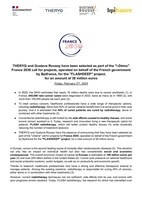ROUSSET, France, Feb. 2, 2024 /PRNewswire/ -- THERYQ, a French company specializing in the development of FLASH radiotherapy systems, and Gustave Roussy, the leading French and European center for cancer research, ranked 4th worldwide, are selected as part of the "i-Démo" / France 2030 call for projects for the "FLASHDEEP" project, with a budget of 38 million euros.
FLASHDEEP will be the world's first FLASH radiotherapy device using very high-energy electrons (VHEE; > 100 MeV). The particle acceleration technology developed by THERYQ stems from research initiated by the European Organization for Nuclear Research (CERN) and the University Hospital of Lausanne (CHUV).
The first clinical FLASHDEEP device will be installed in France, at Gustave Roussy, late 2026, to conduct clinical trials with eligible patients. This system will be able to treat deep solid tumors up to 20 cm thanks to a high-energy electron beam and a dose rate a thousand times higher than that used in conventional radiotherapy. FLASHDEEP represents a major technological advancement in the fight against cancer, offering the prospect of a more effective, better tolerated, shorter, and therefore cheaper treatment than conventional radiotherapy, with no equivalent on the market today.
« THERYQ's mission is to revolutionize cancer treatment by launching a new radiotherapy process called "FLASH." An advanced technique aiming to reduce irradiation time to just a fraction of a second, thus replacing multiple radiotherapy sessions while preserving the patient's healthy tissues. This technology offers the opportunity to treat more cancers resistant to today's radiotherapy treatments, paving the way for a more effective, less invasive, and less toxic treatment for cancer patients," says Ludovic Le Meunier, CEO of THERYQ. He also adds: "Thanks to this funding obtained following an excellent collaboration with the DGE and Bpifrance, THERYQ aims to make all types of solid cancer a manageable condition, allowing FLASH radiotherapy to unleash its curative potential. »
« By irradiating more than 3000 times faster, we can achieve the same anti-tumor effect with fewer toxicities and fewer side effects or increase the irradiation dose on resistant tumors for cancers with less favorable prognoses. The French company THERYQ is the first to have demonstrated the "FLASH" effect based on the use of electrons emitted at very high rates. The first trials will start in 2027 and will focus on inoperable pancreatic and brain cancers. But before that, we need to deepen our knowledge in radiobiology and medical physics to develop new dose calculation methods linked to this new technology," explains Professor Eric Deutsch, head of the Radiotherapy department at Gustave Roussy.
Thanks to the funding provided by Bpifrance as part of France 2030, THERYQ and Gustave Roussy will bring together biologists, physicists, and physicians to conduct the necessary preclinical and clinical studies to demonstrate the improved tolerance and efficacy of FLASHDEEP compared to conventional radiotherapy. They will also submit the CE marking application so that French and European patients in need can benefit from this new therapeutic option as quickly as possible.
In parallel, THERYQ plans to build and equip its industrial platform to enable the launch of the first machines, followed by mass production of FLASHDEEP devices and the start of their commercialization in Europe. This industrial deployment project also represents a great economic opportunity for France, with the creation of more than 600 direct and indirect jobs in the country. Ultimately, it will lead to the revival of a French radiotherapy industrial sector, a field that has been neglected since the late 1980s.
Media Contact:
Merryl Marcout - Relations Presse - AZAPHARM mmarcout@azapharm.com
Fatine Slaoui, THERYQ - fslaoui@theryq.com
Claire Parisel, Gustave Roussy, presse@gustaveroussy.fr
Logo - https://mma.prnewswire.com/media/2332797/France_2030_CP_THERYQ_GR_Logo.jpg
PDF - https://mma.prnewswire.com/media/2332780/EN_France2030_CP_Theryq_GR.pdf


Share this article